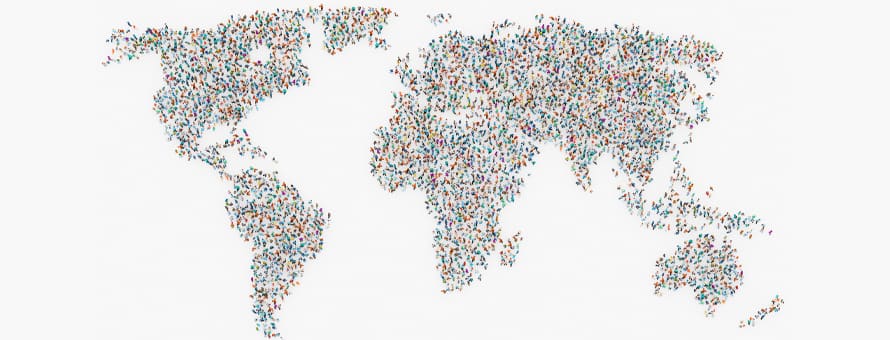What is Population Health Management?

While many healthcare professionals focus on treating individual patients, others, such as population health managers, take a broader view by identifying health concerns and allocating resources to improve overall population health.
The National Institute for Occupational Safety and Health (NISOH) division of the Centers for Disease Control and Prevention (CDC) describes population health as "health within a group of people rather than one person." Population health can coordinate and provide important services and identify inequality issues within those populations.
What is the Meaning of Population Health Management?

“Population health management is the process of studying and facilitating healthcare and its delivery in order to create improvement for a population of individuals," said Dr. Kimberly Gibbons, DNP, CNM, RN, CNL, a member of the clinical faculty of graduate nursing programs at Southern New Hampshire University (SNHU).
Gibbons has 20 years of higher education experience, and in 2020, she received the Daisy Award for Extraordinary Nursing Faculty. Her clinical background focuses on maternal-newborn health, nurse-midwifery practice and nursing education.
A population may focus on a smaller group, or it may capture a much larger group of individuals who share a common characteristic or problem, according to Gibbons. “Ultimately, what we are looking at (in population management) is how to improve the care within that population," she said.
The COVID-19 pandemic emphasized what a population might be, Gibbons said. But the unusual aspect about the pandemic's population was that it included every person on the planet.
“However, within the global population, there are subgroups that have been noted to need additional focus,” she said. “For example, those people with pre-existing medical conditions or those of increasing age.”
The American Public Health Association (APHA) said that it's important to address the social injustices that impact health to ensure everyone has access to the care they need.
When it comes to population health, Gibbons said the question of "why" comes up frequently. For instance, many minority groups were at risk of getting sick and dying from COVID-19, which highlighted the fact that health equity was lacking in the U.S. Gibbons said it was important to ask why that was to improve for the future.
“In this example, one of the things that population health management can do is to bring the problem into focus so we can strive for health equity,” Gibbons said.
How is Population Health Different from Public Health?
Although the work of population health and public health are similar, their responsibilities vary. According to the APHA, public health works to protect and improve the health of communities by:
- Advocating for laws that keep people safe
- Creating safety standards and programs
- Tracking disease outbreaks
It is important that societies work collectively to ensure that people have the conditions in which they can be healthy, and that health and service organizations work together to improve health outcomes within the communities they serve.
According to Gibbons, the goal of population health is to:
- Assess the risks and needs of populations
- Collect and analyze data to improve care of those populations
- Investigate the need for partnerships and how to form them in order to improve care of populations
Gibbons served as part of a team developing a Master of Science in Nursing (MSN) Population Healthcare Management program at SNHU, which she said, “Is designed for nurses, by nurses."
Once a nurse has a bachelor’s degree, the next educational step or rung on the ladder would be a master's degree.
“Master’s prepared nurses are crucial to (the) support of improvement in healthcare," Gibbons said. "A focus on population health at the master’s level provides the academic and clinical skills to do this really well.”
Find Your Program
What Are the Components of Population Health?
According to the National Committee for Quality Assurance (NCQA), there are several elements of population health (NCQA PDF source). Six of them are:
 Care Integration
Care Integration
An Integrated Delivery Network (IDN) is described as a system linking healthcare providers through an organized and collaborative network to understand and provide services to a particular population. IDN systems are in place to assist the population being served and manage and improve clinical outcomes and health status.
 Care Coordination
Care Coordination
This component coordinates all aspects of a patient’s care, integrating services from various providers to ensure proper care and improve health outcomes, while helping reduce costs and eliminate excessive or redundant tests and procedures.
 Teamwork
Teamwork
As inferred, teamwork provides a patient with integrated care rather than fragments of care coming from several views. According to the NCQA, interprofessional teams leverage information, experience, technology and a culture of teamwork to provide value for patients and families.
 Patient Engagement
Patient Engagement
“Patient activation” indicates the knowledge, skills, ability and willingness of a patient to play an active role in their own health care. A broader concept, “patient engagement” combines the patient’s activation role with mediations that are designed to not only increase their own knowledge but to also encourage positive behavior such as preventative care and regular exercise.
 Data Analytics and Health Information Technology
Data Analytics and Health Information Technology
Data is essential to population health management in order to identify a population and measure its needs. This allows the proper care to be delivered to the right people.
 Value-Based Care Measurement
Value-Based Care Measurement
The NCQA said that alternate payment models could adjust fees for service by paying clinicians based on the quality of services provided, rather than simply the volume, and would assist patients with additional services such as transportation, housing and food to improve important population health outcomes.
So, Why is Population Health Management Important?
Population health management helps identify the risks and concerns faced by a population so improvements can be implemented, Gibbons said. Resources can then be allocated through management to provide customized care that best meets the needs of the population and the individual members.

Alum Katie Smith '21MSN learned the value of working in population health during her MSN program at SNHU.
Throughout her program, Smith worked full-time at an infectious diseases clinic. She was also part of a research project at her work, where she created and led multidisciplinary meetings to assess risks to vulnerable populations and coordinate patient care.
She said this was when her degree and her real-world work came together.
“It has been so exciting to put my new knowledge and skills to work while stretching and growing me professionally,” Smith said.
What Does a Population Health Manager Do?
The job description for a population health manager will vary slightly from organization to organization, according to Gibbons. “Generally, the role involves evaluation of data related to the care of individuals and populations in order to identify the need for a plan for improvement,” she said.
While an MSN is not required for some population health management roles, they are considered leadership roles in many organizations. As such, the preparation provided in an MSN education can equip you with the baseline of knowledge, skill and leadership ability that is helpful for highly effective function as a population health manager.
The future of health management, including population healthcare management, looks bright. The U.S. Bureau of Labor Statistics reported that the job outlook for health services managers is projected to grow 23% from 2024 by 2034, and as of May 2024, the median salary was $117,960.*
An MSN in Population Healthcare can help identify ways to connect practice to policy in pursuit of local change. Nurses can learn how non-traditional partnerships among sectors of the community, such as public health, industry, academia, healthcare, local government entities and beyond, can help achieve positive health outcomes.
Nurses with graduate level training in population health can be found in many areas of healthcare. “Population health is not only applied in a hospital, or inpatient, setting. It can also be applied in the community, in businesses or in any place where there are groups of people," Gibbons said.
Population health managers are employed in a variety of settings, and masters’ prepared nurses with education in population health are uniquely prepared to provide this management.
“The settings in which nurses can apply population health are limited only by the imagination," Gibbons said. "(The COVID-19) pandemic has shown us that healthcare impacts us every day, in every way. This presents the opportunity to identify populations and improve health in almost every setting.”
A degree can change your life. Find the SNHU online MSN program that can best help you meet your goals.
*Cited job growth projections may not reflect local and/or short-term economic or job conditions and do not guarantee actual job growth. Actual salaries and/or earning potential may be the result of a combination of factors including, but not limited to: years of experience, industry of employment, geographic location, and worker skill.
Laurie Smith '14 is a writer, editor and communications specialist. Connect with her on LinkedIn.
Explore more content like this article

SNHU Joins Sigma, Global Nursing Honor Society

Academic Spotlight: Dr. Ashley Love, Program Director of Public Health Programs

Academic Spotlight: Dr. Shakera Moreland, Health Sciences Clinical Faculty Member
About Southern New Hampshire University

SNHU is a nonprofit, accredited university with a mission to make high-quality education more accessible and affordable for everyone.
Founded in 1932, and online since 1995, we’ve helped countless students reach their goals with flexible, career-focused programs. Our 300-acre campus in Manchester, NH is home to over 3,000 students, and we serve over 135,000 students online. Visit our about SNHU page to learn more about our mission, accreditations, leadership team, national recognitions and awards.

